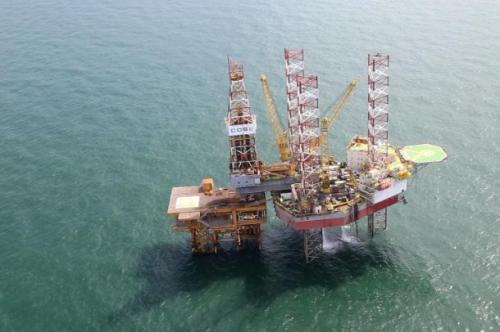



The five-month wait from Andrés Manuel López Obrador's landslide election victory in July till this month, when he was finally sworn in as Mexico's new president, has kept many observers wondering how the change of guard will affect the country's domestic and foreign policies.
Signals were mixed at best, but one thing was unmistakable: the very first ambassador he met after winning the presidency was from China.
López Obrador's agenda for that private meeting in early August was simple, if a bit blunt: how to reduce the trade deficit and increase Mexican exports to China.
Beijing actually loves the idea. When Chinese ambassador Qiu Xiaoqi arrived at the transition team's offices on Chihuahua Street in Mexico City for the meeting, he already had a proposal: Welcome to the China International Import Expo.
The delegation Mexico sent to Shanghai last month for the expo consisted ofover 60 companies and 100 entrepreneurs as well as several ministers and state governors, including two of López Obrador's lieutenants, Graciela Marquez and Marcelo Ebrard, now Mexico's economy and foreign secretaries.
As Guest of Honor at the six-day event, one of only two Latin American countries ever given that distinction, Mexico had not one but two pavilions to promote its food and beverage products, tourism and culture, and other investment opportunities.
Even before the expo there had been good news in the air. Bilateral trade had climbed 11 percent to nearly $48 billion in 2017, and Mexico's avocado exports to China in the first half of this year, a whooping 9,368 tonnes, had already overshot 2017's total.
"In terms of trade and investment, we can see the numbers are growing," said Felipe Garcia, Commercial Counselor of the Mexican Embassy in Beijing, in an interview with China Daily. He stressed the importance of bilateral trade, as "China is our second largest trading partner of Mexico, and Mexico is China's most main (sic) trading partner in the Latin America region," before ticking off in quick succession some of Mexico's proud exports, like avocados and tequila.
While maintaining that bilateral exchanges are "complementary," Garcia also repeated in the interview his wish to "increase the Chinese investment in our country."
Such investments are indeed picking up.

In 2017, China's JAC Motors, a state-owned automobile manufacturer, teamed up with Mexico's Giant Motors to invest $200 million in anSUV auto plant in the central state of Hidalgo. And after China and Mexico decided to set up a joint investment fund of $2.4 billion, one of the fund's first deals in 2016 was to invest $140 million in Citla Energy, a new Mexican oil company. According to a widely-cited Atlantic Council report last year, from 2014 to 2016 Mexico saw more than 40 deals valued at over $4 billion from China, a significant jump since no previous year had seen more than five.
One of the biggest investments came in 2016, when China National Offshore Oil Corporation (CNOOC), a State-own enterprise (SOE) and China's largest offshore oil and natural gas producer, won the exploration rights of two of the ten blocks on offer at Mexico's first-ever deepwater oil fields auction. The oil blocks, near the US-Mexico maritime border in the Perdido fold belt, where the bulk of Mexico's untapped oil is located, are considered "a jewel in the crown" by the Mexican government.
The auction itself was a landmark event in Mexican history as for the first time private and foreign investment was allowed to tap into the country's rich deep-water oil and gas resources, ending three-quarters of a century of state monopoly.
"This is one of the most important Chinese projects during the past years in Mexico," said a visibly excited Garcia, adding breathlessly that CNOOC's exploration plan was approved by the Mexican Hydrocarbons Commission in April, clearing a final hurdle before the drilling.
"So CNOOC will drill between two and four exploration wellsin Block No 1 of the Perdido Foldbelt at the beginning of next year," he said. "This is very important."
This is not CNOOC's first entry into the Mexican market. One of its subsidiaries, China Oilfield Services Limited (COSL), a rig service provider, has been active there for over a decade and has one of the largest offshore rig fleets in Mexico.
Mexico's oil output has steadily declined over the past 14 years, partly due to lack of investment. Consequently, the week before his private meeting with the Chinese ambassador, president-elect López Obrador unveiled an ambitious plan to boost Mexico's crude oil production from the current 1.9 million barrels per day to 2.5 million bpd. In October, he summoned a meeting with major foreign oil companiesand pointedly asked them to accelerate output.
If all signs are to be trusted, it seems CNOOC's involvement in Mexican oil drilling will only deepen. And according to Garcia, there are nearly 1,000 Chinese companies already settled in Mexico. "This situation could not be more satisfactory for both countries," he said.
Thanks to China's opening up and reform policy, now celebrating its 40th anniversary, Chinese companies and SOEs in particular have capitalized decades of stellar domestic growth and are getting increasingly active overseas. And as Chinese President Xi Jinping's signature Belt and Road Initiative enters its fifth year, it's increasingly self-evident that more of them will venture into the international market.
It was on that point that Garcia believed that Mexico's strategic location, bordering the US and a beachhead into Latin America, could help China's global reach.
"Mexico is becoming a hub for international trade that can be very well used by Chinese enterprises to expand their markets," he said. "Mexico and China, we strongly believe in the future the ties between us will be stronger."
If you have any problems with this article, please contact us at app@chinadaily.com.cn and we'll immediately get back to you.